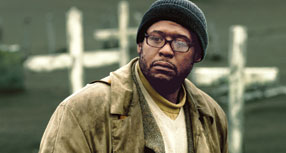A Little Trip To Heaven

“Why is God in Heaven and The Devil underneath the Ground?” is a question posed by A Little Trip to Heaven, a small scale, noirish mix of drama and thriller set in early 1980s Minnesota. “Because it is easier to just to lay down than to it is to fly” is the answer.
The film opens with three unusually staged vehicular crashes, which couldn’t be further from say Michael Bay or Johnathon Mostow style mayhem. These accidents are filmed with stark beauty and the weight of crunching metal and glass. Arriving on the scene of one of these accidents, involving a city bus, is insurance investigator Holt (Forrest Whitaker). He gives a speech to the passengers, some of whom may have climbed on after the accident looking to get in on a possible lawsuit against the city. With the speech Holt plays both good cop and bad cop, sounding more like a Mamet style grift, than an insurance adjustors dry duty. Nearly all the passengers shuffle off the bus because of it. His boss (Peter Coyote) quickly drops an assignment to investigate the death of a petty scam-artist in remote and crumbling North Hastings, Minnesota. It seems that Kelvin Anderson died after ramming his tan coloured Malibu into a tunnel wall and his body was burned to a crisp . The local police are convinced it is an open and shut case, as Kevin’s drivers licence is found, the plates on the car match, and on the other side of the tunnel lives his sister Isold.
Holt is of course immediately suspicious because the charred body is conveniently unidentifiable and Isold (Julie Stiles), the beneficiary of the $1 Million dollar policy, is skittish, nervous and wasn’t even suspecting her brothers visit. Then there is Isold’s husband Fred who is ominously cheerful and nearly all of his body-language is vaguely threatening. This guy has wife-beater written all over him. Holt’s investigation digs up a number of dirty little secrets, as he attempts to get to the bottom of the things. At the same time, he begins to sympathize with the plight of crushing poverty, which defines the lives of Isold, Fred and her 6 year-old son.
Icelandic Director Baltasar Kormákur gives us a Minnesota that is much, much different than say the similarly set neo-noir, Fargo. A Little Trip To Heaven is stylized, decaying, alienating, and lacking almost completely in that down home cheery warmth that characterized the Coen Brother’s masterpiece. The look of the film is all driving rain, wet, slushy snow, barren landscapes of rusty power-lines, spongy permafrost and broken down buildings. It is filmed mainly at night or in grey, desaturated daylight. There is a delightfully odd, twangy soundtrack, which plays counterpoint to the otherworldly feel of the rest of the film.
The film wants to re-define the modern noir structure, and it is partly successful at that. It jettisons the Femme Fatale, and recasts the role as a vulnerable, damaged, perpetually on-edge woman who is never in control. Our hard boiled investigator is anything but that. Forrest Whitaker essays a stand-offish and awkward man who is sharp and competent but is beginning to get a distaste for the nature of his work. He is
crying out for scarred Isold and her lot in life, but still has his job to do.
Ambiguous morality weighs heavily on every character in A Little Trip to Heaven. Holt is not above lying, impersonating police, or breaking and entering to do his investigation but he is a generally likable guy. Insurance adjusting is cast in a viscously negative light, perfectly tuned to the Regan-era setting. The Quality Life Insurance Company runs banal, fear driven commercials are laced with a paternal sense of comfort if you come into their fold. The company is several times compared to a casino, where the house always wins. This is captured no better than Peter Coyote’s false sympathy towards a policy holder whom he convinces to sign on the dotted line for a only a paltry fraction of their rightfully allowed amount. Halfway through his canned explanation to the widow, he is passing her the Kleenex. Surely this is just as evil as a man willing to commit arson or murder for money? Lives are wrecked in both cases.
One weakness in the film is that the characters are not well enough realized. The actors all carry themselves well, however, the performances are all very internal and are often at the service of the plot, which you would expect to play better as a novel than a film. On one hand the film is very straightforward in plot, on the other hand, it is surreal and unsettling in execution. This style will surely alienate many of the viewers, but I found it unusually gripping. For better or worse, the film attempts to ground down excitement or titillation in favour of moody bleakness. This is no better observed than the ending which reaches for the sublime, but is curiously just, well, there.I am doubtful there are any commercial prospects for this movie as it plays bleak, slow, with little action, and walks the line between a police procedural and a moody character driven drama.
If you like commercial styled films which are ambitious in their attempts to go experimental directions, give A Little Trip to Heaven a try, it is highly unusual.

0 Comments:
Post a Comment
<< Home